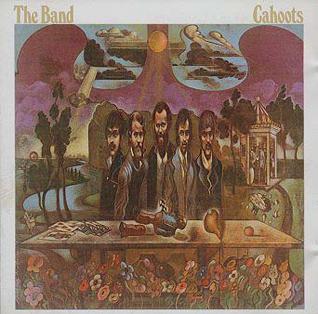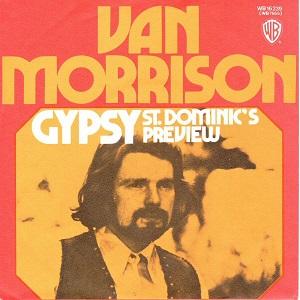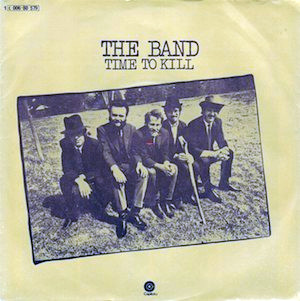Related Research Articles

The Band was a Canadian-American rock band formed in Toronto, Ontario, in 1967. It consisted of four Canadians and one American: Rick Danko, Garth Hudson, Richard Manuel, Robbie Robertson, and Levon Helm. The Band combined elements of Americana, folk, rock, jazz, country, and R&B, influencing subsequent musicians such as the Eagles, Elton John, the Grateful Dead, the Flaming Lips, and Wilco.

Moondance is the third studio album by Northern Irish singer-songwriter Van Morrison. It was released on 27 January 1970 by Warner Bros. Records. After the commercial failure of his first Warner Bros. album Astral Weeks (1968), Morrison moved to upstate New York with his wife and began writing songs for Moondance. There, he met the musicians that would record the album with him at New York City's A & R Studios in August and September 1969.

Cahoots is the fourth studio album by Canadian/American rock group the Band. It was released in 1971 to mixed reviews, and was their last album of original material for four years. The album's front cover was painted by New York artist/illustrator Gilbert Stone, while the back cover features a photograph portrait of the group by Richard Avedon. The album features guest vocals from Van Morrison. Libby Titus, the partner of drummer Levon Helm and mother of their daughter Amy Helm, also contributed uncredited backing vocals to "The River Hymn", the first time a woman appeared on a Band album.
"Acadian Driftwood" is a song by The Band. It was the fourth track on their sixth studio album Northern Lights – Southern Cross (1975), written by member Robbie Robertson. Richard Manuel, Levon Helm and Rick Danko trade off lead vocals and harmonize on the chorus.

"Stage Fright" is the title track of the Band's third album, Stage Fright. It features Rick Danko on lead vocals and was written by Robbie Robertson. According to author Barney Hoskyns, Robertson originally intended it to be sung by Richard Manuel but it became clear that the song was better suited to Danko's "nervous, tremulous voice."
"It Makes No Difference" is a song written by Robbie Robertson and sung by Rick Danko that was first released by The Band on their 1975 album Northern Lights – Southern Cross. It has also appeared on live and compilation albums, including the soundtrack to the film The Last Waltz. Among the artists that have covered the song are Solomon Burke, My Morning Jacket and Over the Rhine.

"The Shape I'm In" is a song by The Band, first released on their 1970 album Stage Fright. It was written by Robbie Robertson, who did little to disguise the fact that the song's sense of dread and dissolution was about Richard Manuel, the song's principal singer. It became a regular feature in their concert repertoire, appearing on their live albums Rock of Ages, Before the Flood, and The Last Waltz. Author Neil Minturn described the song as "straightforward rock." Along with "The Weight," it is one of the Band's songs most performed by other artists. It has been recorded or performed by Bo Diddley, The Good Brothers, The Mekons, The Pointer Sisters, She & Him, Marty Stuart and Nathaniel Rateliff and the Night Sweats.

"Rag Mama Rag" is a song by The Band which was first released on their 1969 album The Band. It was also released as a single, reaching #16 in the UK, the highest of any single by the group. The single was less successful in the US, reaching only #57 on the Billboard Hot 100.
"Sleeping" is a song by The Band, first released on their 1970 album Stage Fright. It was also released as the B-side to the "Stage Fright" single. It was co-written by Robbie Robertson and Richard Manuel. This and “Just Another Whistle Stop” are the only two songs Manuel receives credit for on the album. Music critic Barney Hoskyns rates it as "one of Richard [Manuel's] liveliest performances" and "one of The Band's most intricate arrangements." The Band never featured the song on a live album.

"Gypsy" is a song written by Van Morrison that was first released on his 1972 album Saint Dominic's Preview. It was also released as a single.
"Daniel and the Sacred Harp" is a song written by Robbie Robertson that was first released by The Band on their 1970 album Stage Fright. It has been covered by such artists as Barrence Whitfield.
"When You Awake" is a song written by Robbie Robertson and Richard Manuel that was first released on The Band's 1969 self-titled album The Band. A live performance was included on the Bob Dylan and The Band live album Before the Flood.

"Whispering Pines" is a song written by Richard Manuel and Robbie Robertson that was first released by The Band on their self-titled 1969 album The Band. It was released as a single in France, backed by "Lonesome Suzie".

"Ophelia" is a song written by Robbie Robertson that was first released by The Band on their 1975 album Northern Lights – Southern Cross. It was the lead single from the album. It has also appeared on several of the group's live and compilation albums, and has been covered by such artists as Vince Gill and My Morning Jacket.
"Across the Great Divide" is a song written by Robbie Robertson. It was first released by The Band on their 1969 album The Band and was subsequently released on several live and compilation albums. According to music critic Barney Hoskyns, it was one of several songs that contributed to The Band being something of a concept album about the American South.

"Time to Kill" is a song written by Robbie Robertson that was first released by the Band on their 1970 album Stage Fright. It was also released as a single off the album, backed with the more famous "The Shape I'm In" and, although it failed to reach the Top 40 in the United States, it peaked at #13 in the Netherlands. It has also been featured on several Band compilation and live albums.
"Jemima Surrender" is a song written by Levon Helm and Robbie Robertson. It was first released on the Band's self-titled album in 1969. Usual Band drummer Levon Helm played guitar and sang the lead vocal while usual Band pianist Richard Manuel played drums. The song's lasciviousness helped inspire Naomi Weisstein to form the Chicago Women's Liberation Rock Band.
"The W.S. Walcott Medicine Show" is a song written by Robbie Robertson that was first released on the Band's 1970 album Stage Fright. It was also frequently performed in the group's live sets and appeared on several of their live albums. Based on Levon Helm's memories of minstrel and medicine shows in Arkansas, the song has been interpreted as an allegory on the music business. Garth Hudson received particular praise for his tenor saxophone playing on the song.
"The Unfaithful Servant" or "Unfaithful Servant" is a song written by Robbie Robertson that was first released by The Band on their 1969 album The Band. It was also released as the B-side of the group's "Rag Mama Rag" single. It has also appeared on several of the Band's live and compilation albums.

"Ro Ro Rosey" is a song written by Van Morrison that was written and recorded for Bang Records owner and producer Bert Berns and released on his 1967 album Blowin' Your Mind!. It was also released as the follow up single to "Brown Eyed Girl."
References
- 1 2 3 4 5 6 7 Hoskyns, Barney (2006). Across the Great Divide. Hal Leonard. pp. 256–257. ISBN 9781423414421.
- 1 2 3 4 5 6 7 8 9 DeRiso, Nick (March 17, 2014). "The Band, '4% Pantomime' from 'Cahoots' (1971): Across the Great Divide". Something Else!. Retrieved 2020-08-22.
- 1 2 3 4 5 6 7 8 Aaron, Peter (2016). The Band FAQ. Backbeat Books. pp. 95, 192, 276. ISBN 9781617136139.
- 1 2 3 Harris, Craig (2014). The Band. Rowman & Littlefield. p. 132. ISBN 9780810889040.
- 1 2 3 Hage, Erik (2009). The Words and Music of Van Morrison. Praeger. p. 48. ISBN 9780313358623.
- 1 2 Landau, Jon (November 11, 1971). "Cahoots". Rolling Stone. Retrieved 2020-08-22.
- 1 2 3 4 Hinton, Brian (1997). Celtic Crossroads. Sanctuary Publishing. p. 129. ISBN 186074169X.
- 1 2 Sparacio, Steve (October 20, 1971). "The Bandi for complex music". Berwyn Life. p. 19. Retrieved 2020-08-24– via newspapers.com.
- ↑ Cannon, Geoffrey (October 29, 1971). "Out of the city". The Guardian. p. 10. Retrieved 2020-08-24– via newspapers.com.
- ↑ Evans, Paul (1992). DeCurtis, Anthony; Henke, James (eds.). Rolling Stone Album Guide (3rd, abridged ed.). Straight Arrow. p. 19. ISBN 0679737294.
- ↑ Kemp, Mark (2004). Brackett, Nathan; Hoard, Christian (eds.). The New Rolling Stone Album Guide (4th ed.). Fireside. p. 43. ISBN 0743201698.
- ↑ Ruhlmann, William. "Cahoots". Allmusic. Retrieved 2020-08-22.
- ↑ Brink, Susan (October 5, 1971). "Band's new album a superlative work". Miami News. p. 3-B. Retrieved 2020-08-24– via newspapers.com.
- ↑ Erlewine, Stephen Thomas. "To Kingdom Come". Allmusic. Retrieved 2020-08-22.